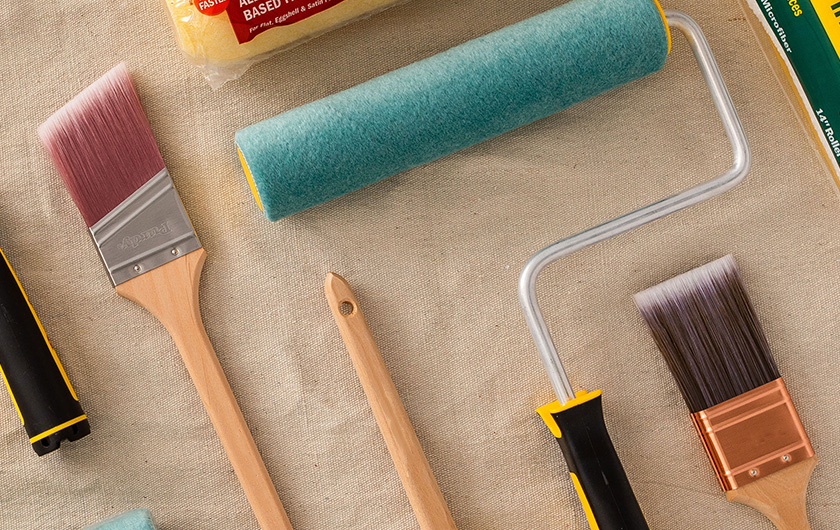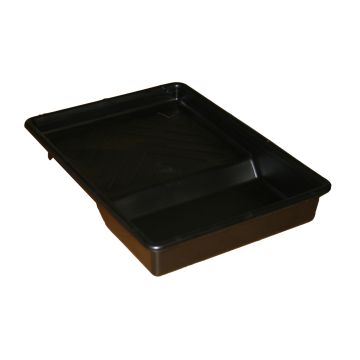
Painting can be a transformative and rewarding task. However, the success of your project largely depends on your choice of tools. In this comprehensive guide, we will focus on two of the most indispensable tools in painting: paint brushes and paint rollers. We will delve into what makes a good brush or roller, exploring top brands and products to help you achieve professional-looking results on your next painting endeavour.
1. Understanding Paint Rollers
There's a wide array of paint rollers available, each designed to fulfil a specific painting requirement. Choosing the right roller can make a significant difference to your painting project.
So, what is the best paint roller to use? This largely depends on the type of paint you're using and the surface you're painting. If you're painting large, flat surfaces such as walls or ceilings, a larger roller might be more efficient. What type of roller do professional painters use? Again, it depends on the job. For smooth surfaces, professionals often prefer a roller with a short nap. For rougher surfaces, a roller with a longer nap is usually more suitable.
You might wonder, what roller is best for emulsion on walls? For most emulsion paints, a synthetic fibre roller is ideal. Synthetic rollers don't absorb water from the paint, allowing the paint to be applied smoothly and evenly. And, what type of paint roller gives the smoothest finish? Foam rollers are often considered the best for a smooth, fine finish. They're especially good for doors and cabinets.
If you're asking which roller do you use for emulsion paint? A medium pile synthetic roller is a good bet. It will hold a good amount of paint and deliver a smooth finish. When it comes to painting interior doors, what is the best roller for that? A small, foam roller often works best for doors. It can easily navigate the panels and recesses of a door, while still providing a smooth finish.
The age-old question is: Is it better to emulsion with a brush or roller? Both can be used, but a roller often makes the job quicker and provides more uniform coverage, especially on larger surface areas. On the other hand, a brush may be needed for smaller, more intricate areas.
2. Spotlight on Paint Roller Products
The market is inundated with various types of paint rollers that cater to different needs. Here, we spotlight some specific paint roller products that may cater to your painting requirements.
- Paint Roller Extension Pole: This tool can be a real game-changer when painting high walls or ceilings, enabling you to reach those tricky spots without strain.
- Foam Paint Roller: Ideal for achieving a smooth and flawless finish, particularly on smooth surfaces. It's great for applying gloss or varnish.
- Small Paint Roller: Perfect for smaller areas or for detailed work. The size provides precision and control.
- 18 Inch Paint Roller: If you have a large area to cover, such as a big wall or ceiling, this size of roller can help you get the job done more quickly.
- Mini Paint Rollers: These are excellent for precision painting, small areas or for touching up.
- Paint Roller Tray: An essential tool for loading your roller evenly with paint.
3. Understanding Paint Brushes
Now that we've discussed rollers, let's turn our attention to the other indispensable tool in painting: brushes.
So, what is the best brand of paint brushes? This can vary based on individual preferences, but brands like Purdy, Harris, Hamilton and Axus are renowned for their quality. And, what brushes do professional painters use? Many professionals prefer brushes with synthetic bristles for water-based paint and natural bristles for oil-based paint.
When buying paint brushes, it's essential to consider the type of bristles, the shape of the brush, the size, and the comfort of the handle. When it comes to painting walls, a larger, flat brush is often preferred. It holds more paint and covers a larger area more quickly. Before painting, should you wet a paint brush? Yes, dampening a brush before using it can help reduce brush marks and improve paint flow.
Is it worth buying expensive paint brushes? Generally, yes. More expensive brushes tend to hold more paint and provide a smoother finish, with fewer visible brush marks. Finally, what is the difference between cheap and expensive paint brushes? Typically, more expensive brushes are made with higher quality materials that can provide a smoother finish and last longer. They often have denser bristles that hold more paint, reducing the number of times you need to reload the brush. Cheap brushes, while they can do the job, may leave more brush marks and not last as long.
4. Spotlight on Paint Brush Products
In addition to considering the type and brand of brush, you also need to think about the specific type of brush you'll need for your project. Let's take a closer look at some of the most popular types of brushes available.
- Fence Paint Brush: These are larger brushes specifically designed for painting fences and other large, flat surfaces. Their large size makes quick work of covering large areas.
- Paint Brush Set: A set typically includes brushes of various sizes and types, providing a range of options for different painting needs.
- Cut In Brush For Painting: These brushes are designed with an angled edge, making it easier to paint straight lines and get into corners.
- Angled Paint Brush: Like the cut in brush, the angled paint brush is perfect for precision work around edges and corners.
- Long Handled Paint Brush: This type of brush can provide extra reach, making it easier to paint hard-to-reach areas.
- Masonry Paint Brush: Masonry brushes are designed for use with thicker, heavy-duty paints used on exterior surfaces like brick and concrete.
- Edging Paint Brush: These brushes have a narrow edge and a handle that is offset from the brush, allowing you to paint more precisely along edges.
5. Brand Focus: Purdy, Hamilton, Wooster and Axus
Let's shift our attention to the brands that are known for their superior quality and range of paint brushes and rollers.
- Purdy: Renowned for their handcrafted brushes and high-quality painting tools, Purdy provides products that professionals swear by.
- Hamilton: Hamilton boasts over two centuries of expertise in creating high-quality brushes and rollers. Their products promise a professional finish.
- Axus: Axus Decor's range of brushes and rollers are designed to offer precision, comfort, and longevity.
- Wooster: Wooster offers a broad selection of high-quality paint brushes and rollers. Their products are praised for their durability and excellent paint application.
Choosing the right tools for painting is as important as the paint itself. With a good understanding of the differences between the types of rollers and brushes, as well as some of the best products and brands on the market, you're well-equipped to make the right choices for your next painting project. Whether you're painting walls, doors, or intricate trim, the right tools will make the job smoother and the result more professional. Remember, good tools are an investment in your home's beauty and can make the painting process more enjoyable too!

